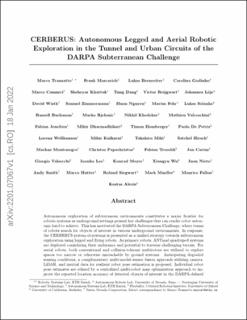CERBERUS: Autonomous Legged and Aerial Robotic Exploration in the Tunnel and Urban Circuits of the DARPA Subterranean Challenge
Tranzatto, Marco; Mascarich, Frank; Bernreiter, Lukas; Godinho, Carolina; Camurri, Marco; Khattak, Shehryar; Dang, Tung; Reijgwart, Victor; Loeje, Johannes; Wisth, David; Zimmermann, Samuel; Nguyen, Dinh Huan; Fehr, Marius; Solanka, Lukas; Buchanan, Russell; Bjelonic, Marko; Khedekar, Nikhil Vijay; Valceschini, Mathieu; Jenelten, Fabian; Dharmadhikari, Mihir; Homberger, Timon; De Petris, Paolo; Wellhausen, Lorenz; Kulkarni, Mihir; Miki, Takahiro; Hirsch, Satchel; Montenegro, Markus; Papachristos, Christos; Tresoldi, Fabian; Carius, Jan; Valsecchi, Giorgio; Lee, Joonho; Meyer, Konrad; Wu, Xiangyu; Nieto, Juan; Smith, Andy; Hutter, Marco; Siegwart, Roland; Mueller, Mark; Fallon, Maurice; Alexis, Konstantinos
Journal article
Accepted version

Åpne
Permanent lenke
https://hdl.handle.net/11250/3027208Utgivelsesdato
2021Metadata
Vis full innførselSamlinger
Sammendrag
Autonomous exploration of subterranean environments constitutes a major frontier for robotic systems as underground settings present key challenges that can render robot autonomy hard to achieve. This has motivated the DARPA Subterranean Challenge, where teams of robots search for objects of interest in various underground environments. In response, the CERBERUS system-of-systems is presented as a unified strategy towards subterranean exploration using legged and flying robots. As primary robots, ANYmal quadruped systems are deployed considering their endurance and potential to traverse challenging terrain. For aerial robots, both conventional and collision-tolerant multirotors are utilized to explore spaces too narrow or otherwise unreachable by ground systems. Anticipating degraded sensing conditions, a complementary multi-modal sensor fusion approach utilizing camera, LiDAR, and inertial data for resilient robot pose estimation is proposed. Individual robot pose estimates are refined by a centralized multi-robot map optimization approach to improve the reported location accuracy of detected objects of interest in the DARPA-defined coordinate frame. Furthermore, a unified exploration path planning policy is presented to facilitate the autonomous operation of both legged and aerial robots in complex underground networks. Finally, to enable communication between the robots and the base station, CERBERUS utilizes a ground rover with a high-gain antenna and an optical fiber connection to the base station, alongside breadcrumbing of wireless nodes by our legged robots. We report results from the CERBERUS system-of-systems deployment at the DARPA Subterranean Challenge Tunnel and Urban Circuits, along with the current limitations and the lessons learned for the benefit of the community.